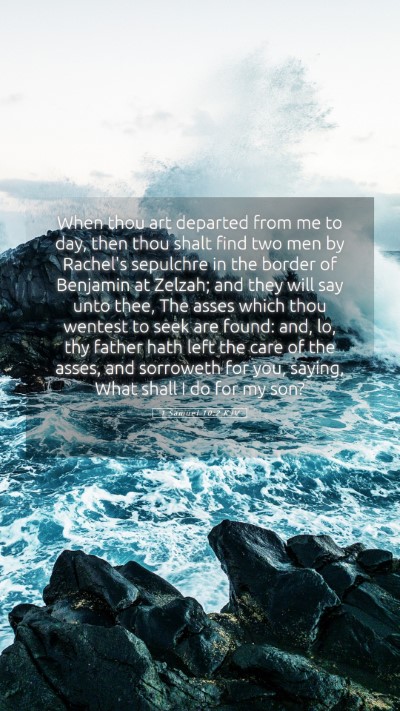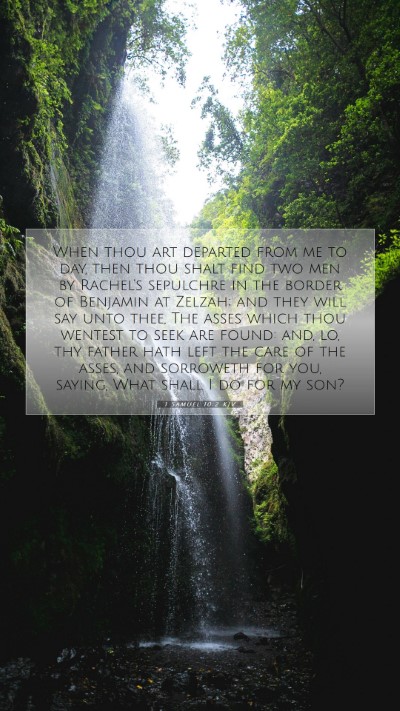Understanding 1 Samuel 10:2 - A Comprehensive Bible Verse Commentary
1 Samuel 10:2 states, "When you leave me today, you will meet two men near Rachel's tomb, in the territory of Benjamin at Zelzah. They will say to you, 'The donkeys you set out to look for have been found. And now your father has stopped worrying about them and is worried about you. He is asking, 'What shall I do about my son?'" This verse is significant in the narrative of Saul’s anointing as king of Israel, indicating divine providence and the unfolding of God's plans through everyday circumstances.
Bible Verse Meanings
This verse illustrates the moment when God begins to establish Saul as the first king of Israel. The prophetic word spoken by Samuel includes specific details that serve to confirm Saul's divine appointment and the path he must take. From a historical context, this moment marks a shift in Israel's governance—transitioning from judges to a monarchy.
Insights from Notable Commentaries
-
Matthew Henry:
Henry focuses on the providence of God in arranging these specific encounters. He emphasizes that God often uses simple events in our lives to lead us toward greater purposes. The mention of Rachel's tomb symbolizes both a historical location and the mourning of Israel, representing both a literal and figurative transition in the nation.
-
Albert Barnes:
Barnes notes that the details offered in the prophecy demonstrate God's omniscient nature and His involvement in mundane aspects of life. The appearance of the two men and their message serves to reassure Saul, pointing out that God is mindful of his situation and actively guiding his steps.
-
Adam Clarke:
Clarke provides a thorough interpretation of the significance of the location mentioned in the verse. He explains that Rachel’s tomb is a poignant reminder of loss and heritage in Israel. Further, he articulates the message the men convey is intended to alleviate Saul's fear, reinforcing that God is at work even when we are unsure of our path.
Application of the Verse
This passage encourages believers to recognize God’s hand in their lives, even in ordinary events. It serves as a reminder that God’s plan often unfolds through everyday experiences. Saul’s initial uncertainty and the reassurance he receives can apply to anyone facing uncertainty in their path—trust in divine guidance is central to spiritual maturity.
Cross References
- 1 Samuel 9:15-17: The Lord revealed to Samuel that He had chosen Saul to be king.
- 1 Samuel 10:1: Samuel anoints Saul, demonstrating God’s divine choice.
- Proverbs 3:5-6: Trusting in the Lord and acknowledging Him leads to clear guidance.
Conclusion
1 Samuel 10:2 reflects a critical juncture in both Saul’s life and the history of Israel. Through public domain commentaries, we see the depth of meaning in this scripture, leading to enhanced Bible verse understanding. For those engaging in Bible study, this verse encourages an open heart to perceive God's direction amidst life’s complexities.
In summary, the verse not only serves to outline a specific moment in history but also provides timeless insights into our spiritual journey. The importance of seeking understanding in Scripture and applying biblical teachings to daily life cannot be overstated.


